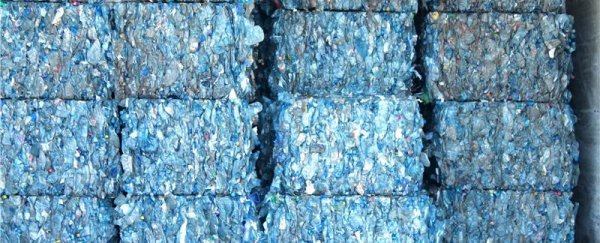Young entrepreneurs in Mexico have developed a system that can convert PET (polyethylene terephthalate) bottles into a type of mineral paper that's waterproof and phytodegradable.
Developed by a company called Cronology, the new technique claims to be 15 percent cheaper than traditional paper manufacturing methods because it doesn't use water or chemicals such as chlorine, as well as being far more environmentally friendly.
"By not cutting trees, nor using water we reduce costs and help the planet," Ever Adrian Nava, co-founder of Cronology, explained in a press release.
"The mineral paper is stronger than the standard, you can not break it with your hands, is waterproof, has the quality of being photodegradable and only absorbs the necessary amount of ink when printing," Nava added.
Mineral paper is also known as peta paper and stone paper, and it meets the quality standards required to be used to print books, general stationary and also boxes.
It's not the first time that plastic has been turned into paper - in Spain and Taiwan companies are already manufacturing paper using a similar process - but the team claims that the Cronology system is four times cheaper than other methods.
The process works by first breaking plastic bottles down into bead like pellets with pieces of calcium carbon and stone. The resulting pellet mixture is then heated to more than 100 degrees Celsius and rolled out into large sheets of paper - using a machine that's sort of like the kind used for tortilla manufacturing, the release adds.
It takes 235 kilograms of PET bottles in order to make one ton (907 kilograms) of mineral paper - but the process also saves those bottles from ending up in landfill, so it's a win/win.
The only downside, the team notes, is that you can't write on the resulting paper with ink gel because it contains alcohol. But regular ink works fine.
The company was funded after winning a competition for emerging green companies in Mexico, and its aim is to help reduce costs and deforestation in the country, which currently produces 700,000 tons of paper per year.
When you consider how much paper and cardboard we all go through daily, despite our best attempts at paperless offices, and, how many plastic bottles we end up tossing out, it seems like a pretty ingenious solution.
The only real question is, why aren't more countries doing this already?
